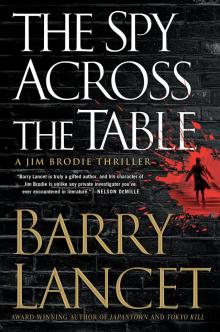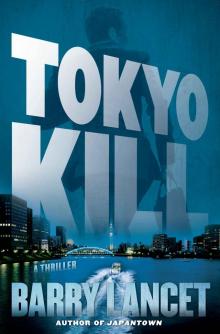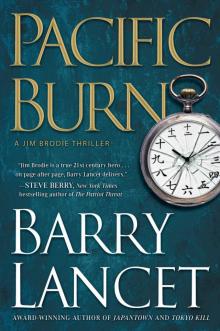- Home
- Barry Lancet
Pacific Burn Page 13
Pacific Burn Read online
Page 13
“Brodie, it’s okay,” Mari said.
“No, it’s not.”
I hadn’t been able to save the young Akihiro, but maybe I could ease the pain of another starling among us. But Noda was having none of it: “Either she’s part of the team or she bows out.”
For Mari, it was to be trial by fire.
* * *
One of the guards let us in. The Kyoto police had yet to arrive but they wouldn’t be far behind.
Mrs. Nobuki stood alone at the far end of the family room, in front of a beige couch with matching chairs. She wore a one-piece sleeveless housedress. Her arms were crossed and hugging her chest.
I’d asked the watchmen to be subtle. If any questions came up, they were to stall until I showed up, since I felt duty-bound to relay the news myself. One look at Ken’s wife told me that all subtlety had left by the back door the moment reinforcements had arrived at the front. She had only two words for us, spoken with uncharacteristic abruptness: “Tell me.”
I hesitated and Mari stepped into the void. “Nobuki-san, perhaps you should take a seat. We—”
“Tell me,” she repeated, a faint tremor rippling her lower lip. “Security has tightened. They got to Akihiro, didn’t they?”
Her husband’s calligraphy graced a pair of hanging scrolls on the left wall. His pottery lined a three-tiered shelf on the right. One of Shu’s toy cars nudged the chair leg near her right foot, but her grandson was nowhere in sight.
Mari said, “Mrs. Nobuki, please . . .”
“No more.” She raised a hand to stop all conversation. “Brodie, tell me.”
My friend’s wife stood before us, rigid and demanding and as fragile as porcelain.
I opened my mouth to speak, but Noda got there first.
“He’s dead,” the bulldog detective said. Simple, abrupt, no punches pulled.
I winced and expected Mrs. Nobuki to shatter. Her eyelids drooped, then closed. She swayed on her feet.
Mari rushed forward, then paused halfway across the room. Mrs. Nobuki’s body stiffened. The swaying ceased. A shiver shook her frame. Another tremor rippled across her lips. She pursed them. The Nobuki matriarch was struggling. Reaching for some inner strength.
We waited. We didn’t speak. Neither Noda nor Mari nor I exchanged glances. Our attention was on our client as she grappled with yet another casualty.
It is too much for one person, I thought. Especially for a mother.
And yet she held on. She hadn’t fainted or fallen. Color began to return to her features. We were witnessing a shattered heart recycling. A rebirth. A matriarchal phoenix rising.
Her eyes opened.
I said, “I’m sorry. So sorry.”
Unable to find her voice, she simply nodded. A tear trickled down her left cheek. With dignity, she lowered herself onto the couch. I eased into the neighboring chair and clasped her hand lightly in mine. She did not pull away. Her eyes eased shut once more.
I’d done everything the Brodie Security staff and I could think of, and the effort had fallen gravely short. She knew it. I knew it. Noda knew it. And Mari was learning it.
There was nothing more to be said.
Mari disappeared into the kitchen and a moment later reappeared with a pot of green tea. She poured a cup and set it in front of Mrs. Nobuki without a sound.
The silence lengthened. We waited some more. Steam from the hot beverage rose from the cup.
When Mrs. Nobuki finally opened her eyes, she greeted us with a weak smile, then her eyes dropped to the tea. “Thank you,” she said.
My friend’s wife sipped the beverage gratefully. A little more color returned to her cheeks. She said, “Tell me the rest,” so I did.
“That was our Akihiro,” she said when I’d finished. “Rebellious, impulsive, sensitive, romantic. He wanted his girl to see the city, but he should have stayed hidden.”
I nodded but said nothing.
“He might have had a chance then,” she said more to herself than to me.
Maybe, I thought, or maybe not.
CHAPTER 36
WHILE Noda and Mari headed back up to Tokyo to continue working the case, I needed one more night in town in order to check on Sarah’s Oribe tea bowls.
Two watchdogs from our affiliate trailed me back to my hotel, a small hideaway in the Pontocho district near the canal with the weeping cherries. Under normal conditions, I liked to stroll along the channeled stream in the evenings and enjoy the glow of the streetlamps on the backstreets. During the day, I usually lingered over the way the cherry trees reflected off the water, whether in bloom or drooping with greenery.
December offered only bare branches, yet the quarter still displayed all the classic touches of the ancient Japanese capital. Elegantly fashioned wooden homes. Traditional sweets shops. Delicately woven bamboo vases in display windows. At night, people meandered along the shaded lanes under lamplight. A muted hum of excitement hung in the air. All was dignified and respectful.
But on this trip, for me, there would be no casual strolls—day or night. Not with the Steam Walker on the prowl. I could still take in the ambiance, but only from the safety of a moving vehicle with bodyguards in attendance.
Once I unlocked the hotel door, the senior of my two watchers nodded me aside, then entered. I waited in the hall while the duo cleared the room.
They didn’t return immediately.
After the third minute, I began to worry.
After the fourth, the younger of my minders poked his head out the door and motioned me inside. His partner greeted me with a frown. “Someone’s been here.”
He pointed to an envelope with my name in Japanese, leaning against the bedside lamp.
“Anything else?”
He shook his head. “No bodies, no bugs, just the letter. We called down to the front desk. They don’t deliver to the room. They keep everything downstairs, and turn on the message light.”
The envelope was not hotel stationery.
“Recognize the handwriting?” the senior bodyguard asked.
“No.”
He nodded. “Go ahead and open it. Outside’s clean. Inside looks okay. But by the edges. We’ll still want to check for prints.”
I lifted the missive by its edge, pushed open the flap with the pointed end of a hotel pen, and shook out the quarter sheet of paper inside.
It fluttered from its casing, falling faceup on the bed, its message in Japanese succinct and ominous:
Tonight. Alone. Nine o’clock. Takemori no Komichi. Start down the path.
A mandatory meet at a bamboo forest on the outskirts of Kyoto. The Steam Walker had found me. Just as he’d found Akihiro.
* * *
I had three things to do.
Urgently and in a specific order.
First, I called the lead man on the Nobuki family, told him I had contact, and put the team on high alert. Whoever had left the communiqué had slipped in and out of my room without a trace. Next, I turned to my backup, both Kyotoites, and asked for their take on the meeting spot.
“It’s a classic Arashiyama bamboo grove,” the older one said. “Illuminated for tourists and lovebirds. Civilians will be all around. Smart choice.”
“They’ll spot backup?”
“Yeah. Alone is your only bet.”
“Could we end up alone in public?”
He considered the question. “Maybe. But they can’t know in advance.”
“So it’s public enough.”
He nodded. “We could put a few random strollers behind you, but they wouldn’t be hard to pick out.”
“Got it,” I said. “Not an option.”
Last, I contacted Noda and brought him up-to-date.
“Know the area,” he said from the bullet train. “You’ll have to go it alone, unless you don’t go at all.”
“I’m going.”
“Advantage is all theirs.”
“No way around it.”
I heard a low growl of protest at the back
of his throat. “Best we abort. We’ll get the Walker another day.”
“There’s no we this time. I’m heading out there.”
“Listen, Brodie—”
“Forget it, Noda-san. Akihiro and his girlfriend are dead. Toru’s dead. Ken’s in a coma. I’ve got to get a handle on this.”
The chief detective fell silent. If he hadn’t been on a train rocketing to Tokyo at one hundred and eighty miles an hour, I had the sense he would have tackled me and strapped me to a chair until I cooled down. As it was, he mumbled to himself under his breath, then said, “You’ve got your father’s talent.”
“So you told me a few months back.”
“Instincts on target.”
A chill bloomed at the back of my neck. The gruff detective was reaching for diplomatic. This conversation would not end well.
“Heard that before too.”
“Take it slow,” he said. “Don’t rile whoever shows up.”
“You mean the Steam Walker. He’s been untouchable. We’ve got to change that.”
“But not tonight. Not alone.”
“It’s settled. I’m going.”
Shifting in his seat, Noda acquiesced with a growl. “Okay, then try not to get yourself killed.”
CHAPTER 37
I BREATHED in the rarefied air of Kazuo Takahashi’s antiques shop. The brisk clean smell of the interior cleared my head. The faint mustiness spoke of centuries past, and instantly lifted my spirits.
“Brodie-san, welcome back,” he said, with a slight bow. “It’s been too long. You should visit us more often.”
With the meet in the bamboo grove hanging over my head, I’d debated whether to view the tea bowls today or postpone my visit until tomorrow. But as soon as I stepped through the door, I knew I’d made the right choice.
I said, “I know, I know.”
My art dealer friend was small, quiet, self-effacing, and well groomed. His blue wool suit was tasteful and modest. He wore a freshly starched white dress shirt and a red necktie, smartly knotted. Every hair knew its place. There were millions of men in Japan who were as particular about their presentation as Takahashi, but none of them had his perfect eye.
He led me to the rear of the shop. With a diffident sweep of his hand, he said, “Here they are.”
A pair of Oribe bowls lined a back counter. One in the green-and-white mode, the other black-over-white.
“They both look excellent,” I said.
Takahashi smiled. His intelligence was palpable. So was the lively glint in his look.
“Take your time,” he said.
I stepped up to the counter. My gaze swept over the bowls. I lifted one, then the other. Both were enchanting. Both had the signature Oribe look—charming abstract designs on fields of white, alternating with wide swatches of green or black glaze. One had interlocking circles, the other stylized plum blossoms and geometric shapes.
“Impressive,” I said.
“Ah, but which to choose?” The glint in his eyes grew brighter.
The art of the tea bowl was elusive, and the ornamentation of the Oribe bowl equally complex. There needed to be balance and perfect placement and open space that allowed the decoration to breathe. There needed to be a dynamic yet serene profile.
I pointed at the black bowl. “Great shape and decoration. Superb lip.”
Takahashi nodded. “The bowl seems to dance, does it not?”
“It does.”
And there needed to be a good depth to the glaze and to the interior “scenery.” Again the black was superior, its glaze luxuriant yet subdued. The interior walls swept downward in a dramatic touch. The bottom had a full, luscious curve that finished with a subtle indentation at the center.
“Breathtaking,” I said, pulling my eyes away with reluctance.
“Don’t forget the underside.”
The finishing touches. “Of course not.”
I lifted the bowls to view the bottoms, and again the black won out. “Brilliant. Wonderfully textured clay and a nicely turned foot. Very natural.”
Takahashi was pleased. “The best of the two, of course, and of the twelve I looked at in five shops.”
“You’ve worked hard. Thank you.”
He smiled. “You told me it was for an important client, and we have to keep you in rice. My only complaint is that you always walk away with the finest pieces.”
“And yet you continue to test me.”
“Amusement is the price I must extract for my exertions.”
“My client will love the black bowl.”
“I’m glad.”
Takahashi’s voice fluttered with suppressed excitement.
I eyed him with mock suspicion. “You have a line on something else, don’t you?”
He chuckled. “How do you always know?”
“Trade secret,” I said.
“Then you should keep it. But you are correct. An absolutely stunning piece I sold ten years ago may come back on the market any day now, if you can wait. It’s pricier than either of these, but it’s a minor masterpiece.”
“Nothing’s wrong with it?”
“Only that its owner needs to raise some quick cash. Interested?”
“Yes.”
The Japanese tea bowl is the spiritual center of the tea ceremony, so the demands on the artist-potter are immense. To bring together the lip, profile, inner surface, and concluding foot with the right feel takes the artistry of a master. To consistently bring them together with an aesthetically pleasing balance of clay, glaze, and firing as well requires the touch of a genius. The black Oribe was a prime example. What Takahashi was offering was a step above it—and why I accepted his proposal of the second piece sight unseen.
“It’s yours, then.”
“That’s extremely generous. What can I do for you?”
“There is one thing,” my art dealer friend said.
“Name it.”
In exchange for supplying me with Japanese art, I helped Takahashi secure the Western pieces his clients demanded, sometimes bidding in his place at Sotheby’s or Christie’s.
Takahashi prefaced his answer with a nod toward my bodyguards, who waited at the front of the shop, out of earshot. “Give up your father’s work. Focus on art.”
“Anything but that.”
Takahashi clasped his hands tightly behind him. “Every moment you spend away from the art world is a loss. You have a first-rate eye, and you can teach people so much of what Japanese art has to offer. And art in general. You are also a good conduit for our country. There are so few and we are a shy people.”
“I am hardly all of that, but I’m sure I can handle both jobs.”
A sadness darkened his usually cheerful aspect. “I beg you to reconsider. There is so much menace in your other line of work. And the life expectancy, I fear, is—how should I put it—so very tenuous.”
CHAPTER 38
THE WESTERN EDGE OF KYOTO, 9 P.M.
HE fell in step a half a pace behind and ordered me not to look back.
“Glad you could make it, Jim Brodie.”
The words were relayed in a whisper reminiscent of steam pushing itself loose from a covered pot. A low brooding hiss of a sound that was hot and moist on the back of my neck.
“The pleasure is all yours,” I said.
A breathy chuckle. “I like a good tourist attraction, don’t you?”
No one was nearby, but still he whispered.
“Not particularly.”
“It suits our needs,” my unseen host said.
We were ambling down a walkway that cut through a forest of giant Japanese bamboo. A low thatch fence framed the trail on both sides and prevented visitors from penetrating the grove. Fifty-foot stalks shot into the night sky, their leafy green tops curving inward and enveloping us in a tunnel of darkness. Dim amber floodlights behind the thatch illuminated the base of the bamboo and rose to meet a second line of vivid blue-and-green illumination, brightening the sides of the living tunnel whi
le keeping the viewers in semidarkness. All of which allowed the man behind me to hide in plain sight.
“Our?” I said.
“I am a messenger. You will see me once. If you ignore the message, the next time, he will visit, and you will not see anything—ever again.” A hiss seemed to linger long after the last two words had been uttered.
I wondered what was behind the whisper. A medical problem or an old battle wound perhaps. Maybe a partially crushed throat. Not enough to kill but enough to maim and distort.
“He?”
The sneer in my host’s voice was evident. “Spare me your amateur fishing expeditions, Jim Brodie. For clarity, let me lay out the ground rules. People are stationed along the route, behind and ahead.”
And, I thought, in the bamboo. Twice I’d heard a faint rustle of leaves to the left. Human, not animal movement.
Aloud I said, “Noted.”
“If you try anything, they will extract me and finish you.”
Don’t rile whoever shows up.
With a thick cloudbank smothering the moonlight, my host and his crew had plenty of cover from which to work. The bamboo shimmered. The illumination was dramatic, dark, and indirect. Ahead and behind us, couples drifted languidly along. Paired silhouettes with hands interlocked. Occasionally bumping shoulders like two anchored boats nudged by the tide.
“Maybe I’ll grab you as a shield,” I said.
“Then you will die.”
We walked in silence for a dozen paces. At our feet, Japanese lanterns dotted the edge of the path, their glowing patches of soft yellow light hovering around our ankles. More contained light. Hoping to catch a glimpse of my host, I started to turn my head.
“Do not look back, Jim Brodie,” he said.
I returned my eyes front and center. I wondered what was behind the stilted syntax. Social awkwardness, or something else.
I said, “Why didn’t you kill the child in Napa?”
“Why did not he? He has rules. He will not touch children. If you wish to know more, you may ask him in person should you ever have the chance. But if he shows himself, I doubt there will be time for talk.”

 The Spy Across the Table
The Spy Across the Table Tokyo Kill
Tokyo Kill Japantown
Japantown Pacific Burn
Pacific Burn